Nickel Boys (2024): racism from the victim's POV | racismo desde la piel de la víctima
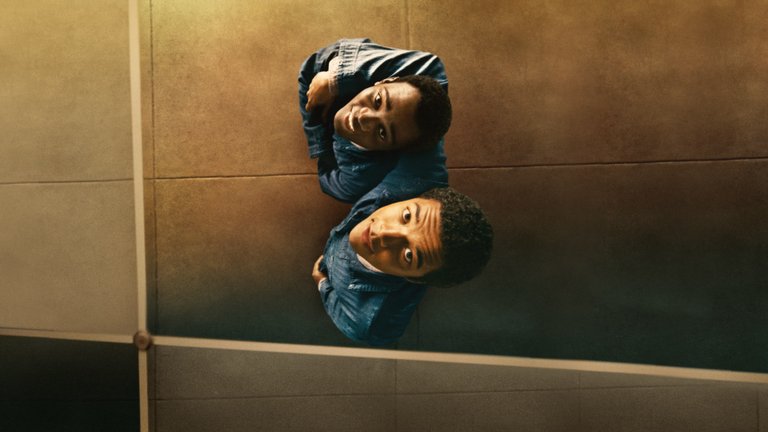
In my last review (Jellyfish) I mentioned some coming-of-age films and included this title in the list, but after uploading the post I realized that, among all the posts I made in February about the Oscar-nominated films, I didn't get around to upload two of them before the night of the gala. One was the review of the Bob Dylan biopic, A Complete Unknown, which I published the week after the awards; and the other was this one that I'm publishing now to settle that debt.
En mi última reseña (Jellyfish) mencioné algunas películas coming-of-age e incluí este título en la lista, pero luego de subir el post me di cuenta de que, en medio de tantas publicaciones que hice en febrero sobre las películas nominadas a los Oscars, no alcancé a subir dos de ellas antes de la noche de la gala. Una fue la reseña de la biopic de Bob Dylan, A Complete Unknown, la cual publiqué la semana después de los premios; y la otra fue esta que estoy publicando ahora para saldar esa deuda.
Nominated for Best Adapted Screenplay and Best Picture at the last Academy Awards, Nickel Boys is an American film directed by RaMell Ross and co-written by him and Joslyn Barnes, based on the Pulitzer Prize-winning novel of the same name by Colson Whitehead. It tells the story of Elwood Curtis, an African-American teenager who lives with his grandmother after his parents abandon him when he was only six years old. It's the early sixties and despite living in a city where segregation is still very strong, Elwood finds inspiration in the speeches of Martin Luther King Jr. and in his grandmother's love for him. The boy likes to read, behave, help his nana and stay out of trouble. Some would say he's somewhat pretentious but not because Elwood considers himself better than others, but because it's others who reject Elwood for reflecting their shortcomings to them. Excelling in his studies, Elwood is offered the opportunity to take a course at a college despite still being in high school and excited to get there he accepts a ride from a colored stranger traveling in a car... which turns out to be stolen. Curtis is then arrested, but since he's a minor, he's not sent to prison but to the Nickel, an infamous reformatory for misguided boys. This will be the first of several unfair situations that will divert Elwood's destiny and take him forever away from the promising young man we all - including himself - thought he would become.
Nominada en las categorías de Mejor Guion Adaptado y Mejor Película en la última entrega de los premios Oscar, Nickel Boys es una película norteamericana dirigida por RaMell Ross y co escrita por él junto a Joslyn Barnes, basándose en la novela homónima ganadora del Premio Pulitzer escrita por Colson Whitehead. En ella se cuenta la historia de Elwood Curtis, un adolescente afroamericano que vive con su abuela luego de que sus padres lo abandonaran cuando apenas tenía seis años. Corren los primeros años de la década de los sesenta y a pesar de vivir en una ciudad en la que la segregación sigue siendo muy fuerte, Elwood encuentra inspiración en los discursos de Martin Luther King Jr. y en el amor que le profesa su abuela. Al chico le gusta leer, portarse bien, ayudar a su nana y no meterse en problemas. Algunos dirían que es algo pretencioso pero no porque Elwood se considere mejor que los demás, sino porque son los demás los que rechazan a Elwood por reflejarles sus carencias. Sobresaliente en los estudios, a Elwood le ofrecen la oportunidad de hacer un curso en una universidad a pesar de encontrarse aún en la secundaria y emocionado por llegar allí acepta el aventón de un desconocido de color que viaja en un automóvil... que resulta ser robado. Curtis entonces es detenido, pero como es menor de edad no lo envían a prisión sino a la Nickel, un infame reformatorio para chicos descarriados. Esta será la primera de varias situaciones injustas que desviarán el destino de Elwood y lo alejarán para siempre del prometedor joven que todos - incluso él mismo - pensamos que llegaría a ser.
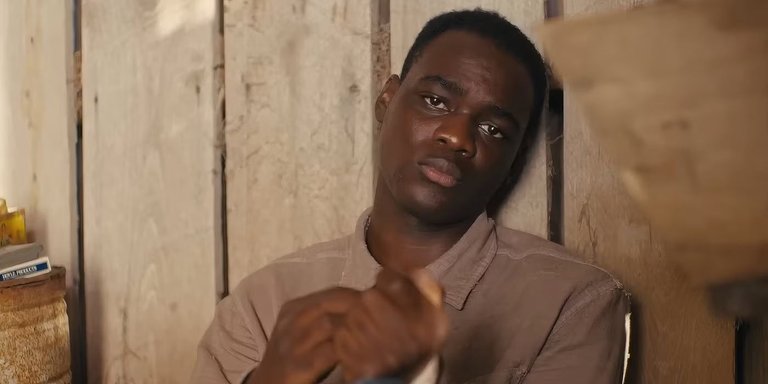
At Nickel, Elwood befriends Turner, a young man who has been there for some time and comes from Houston, a large city, according to Turner himself, unlike these godforsaken rural towns. Through Elwood and Turner's interactions with the other inmates, we begin to realize that Nickel isn't so different from the outside world. The racism, injustice, and abuse that occur in cities, both large and small, also occur in this small hell, which, far from reforming young people and guiding them toward healthy, positive lives, irrevocably corrupts them.
En la Nickel Elwood entabla amistad con Turner, un joven que lleva tiempo allí y que viene de Houston, una ciudad grande según el propio Turner, no como estos pueblos campestres perdidos de la mano de Dios. A través de las interacciones entre Elwood y Turner con los demás internos nos iremos dando cuenta de que la Nickel no es tan diferente del mundo exterior. El racismo, la injusticia y los abusos que se cometen en las ciudades, grandes y pequeñas, también se cometen en este pequeño infierno que lejos de reformar a los jóvenes y guiarlos hacia vidas sanas y positivas, los pervierte de manera irremediable.
I read Whitehead's novel before seeing the movie, so I knew what to expect and although obviously the movie can't tell everything that happens in the book, I think they told the most important things, although many of them are a bit implied and I don't know if they will be clear to people who haven't read it. However, I liked that Ross decided to include sequences of Elwood's life before the reform school and those flash forwards of what happened after he left the Nickel. This breaks the linearity of the narrative and gives it dynamism, as well as increasing a bit the anticipation of people who want to know what, how and when what they don't yet know, but already suspect, will happen. Whitehead's prose is so vivid and so well written that to read it is to see the movie inside your head; so somehow I felt I had already seen this story, but then the director came up with an idea that surprised me: filming the movie in first person. For the first ten minutes we don't see Elwood, but what he sees, as if we had preferential seats behind his eyes, or better yet, as if we were him. My first thought was “How interesting”, but I soon feared that the resource would become tedious and boring due to the 140 minutes of the film and I also thought that if they showed me the whole film like that I wouldn't be able to appreciate the performance of the protagonist; and then the director surprised me again by keeping the resource, but changing the person. That is to say, throughout the film, Elwood's first-person view alternates with Turner's and that gives it enough dynamism so that the resource doesn't become tiresome and maintains a uniformity in the way of narrating.
Me leí la novela de Whitehead antes de ver la película, así que ya sabía qué esperar y aunque obviamente la película no puede contar todo lo que ocurre en el libro, creo que contaron las cosas más importantes, aunque muchas de ellas está un poco implícitas y no sé si quedarán claras para las personas que no lo hayan leído. Sin embargo, me gustó que Ross decidiera incluir secuencias de la vida de Elwood antes del reformatorio y esos flash forwards de lo acontecido después de abandonar la Nickel. Esto rompe la linealidad de la narración y le da dinamismo, además de aumentar un poco la expectación de las personas que desean saber qué, cómo y cuándo ocurrirá lo que aún no saben, pero ya sospechan. La prosa de Whitehead está tan viva y tan bien escrita que leerlo es ver la película dentro de tu cabeza; por eso, de alguna manera, sentí que ya había visto esta historia, pero entonces al director se le ocurrió una idea que me sorprendió: filmar la película en primera persona. Durante los primeros diez minutos no vemos a Elwood, sino lo que él ve, como si tuviéramos asientos preferenciales detrás de sus ojos, o mejor aún, como si fuésemos él. Lo primero que pensé fue "Qué interesante", pero pronto temí que el recurso se volviera tedioso y aburrido debido a los 140 minutos de la cinta y además también pensé que si me mostraban toda la película así no iba a poder apreciar la actuación del protagonista; y entonces el director volvió a sorprenderme manteniendo el recurso, pero cambiando de persona. Es decir, a lo largo de toda la película se va alternando la vista en primera persona de Elwood con la de Turner y eso le da el suficiente dinamismo para que el recurso no resulte fastidioso y mantiene una uniformidad en la manera de narrar.

I would have told the film from a more traditional perspective, just as I imagined it when I read the novel, but after watching Nickel Boys and thinking it over, I realized that it would have been a huge challenge to show in that format certain scenes that in the book surprise with their plot twists; instead, the director's first-person narration resource, and especially the way he executed it throughout (in 95% of the film), helps maintain the tension just before certain painful discoveries that occur in the plot. I suppose that's why he's a film director and I'm not (lol).
Yo habría contado la película desde una perspectiva más tradicional, tal como la imaginé en mi cabeza al leer la novela, pero luego de ver Nickel Boys y pensarlo mejor, me di cuenta de que habría sido un gran desafío mostrar en ese formato ciertas escenas que en el libro sorprenden por sus giros argumentales; en cambio, el recurso de narración en primera persona del director, y sobre todo la forma en que lo ejecutó en todo momento (en un 95% de la cinta), ayudan a mantener la tensión justo antes de ciertos dolorosos descubrimientos que ocurren en la trama. Supongo que por eso él es un director de cine y yo no (lol).
Ethan Herisse, Brandon Wilson, Hamish Linklater, Fred Hechinger, Daveed Diggs and Aunjanue Ellis-Taylor all did a great acting job; Ross's direction in this first feature in his career was terrific as well; the script and the choice of first-person narration were another hit; but all of them - in my opinion - are indebted to Colson Whitehead, the creator of a novel that although it uses fictional characters and a place that never existed - the Nickel is a fictional reform school as well - it was based on real events that occurred at the Dozier School for Boys. In addition, the entire socio-political context is real. The 1960s were strange, painful, unfair, unjust, contradictory years for the black community in the US. An African-American citizen could go to war to defend his country and die for it, but he was forbidden to enter certain places; many schools separated their students by the color of their skin; even inside reform schools, as in Nickel, white boys were separated from black boys and if the former were treated badly, the latter were treated even worse. I recommend both reviewing this movie and reading the two novels with which Whitehead won the Pulitzer Prize, Nickel Boys and The Underground Railroad, the latter adapted in mini-series format - winner of a Golden Globe - and available on Amazon Prime Video, have any of you seen this movie or the series? have you read any of Colson Whitehead's books? I'll read you in the comments.
Ethan Herisse, Brandon Wilson, Hamish Linklater, Fred Hechinger, Daveed Diggs y Aunjanue Ellis-Taylor, todos hicieron un gran trabajo actoral; la dirección de Ross en este primer largometraje en su carrera estuvo estupenda también; el guion y la elección de la narración en primera persona fueron otro acierto; pero todos ellos - en mi opinión - están en deuda con Colson Whitehead, el creador de una novela que aunque utiliza personajes ficticios y un sitio que nunca existió - la Nickel es un reformatorio ficticio también - sí se basó en hechos reales ocurridos en la Dozier School for Boys. Además, todo el contexto socio político es real. Los años sesenta fueron años extraños, dolorosos, injustos, contradictorios para la comunidad negra en los EEUU. Un ciudadano afroamericano podía ir a la guerra a defender a su país y morir por él, pero tenía prohibida la entrada a ciertos lugares; muchos centros de estudios separaban a sus estudiantes por el color de su piel; incluso dentro de los reformatorios, tal como sucede en la Nickel, los muchachos blancos estaban aparte de los muchachos negros y si a aquellos los trataban mal, a estos los trataban aun peor. Recomiendo tanto la revisión de esta película como la lectura de las dos novelas con las que Whitehead ganó el Premio Pulitzer, Nickel Boys y The Underground Railroad, esta última adaptada en formato de mini serie - ganadora de un Globo de Oro - y disponible en Amazon Prime Video, ¿alguno de ustedes ha visto esta película o la serie? ¿han leído algún libro de Colson Whitehead? Los leo en los comentarios.
Reviewed by | Reseñado por @cristiancaicedo
Other posts that may interest you | Otros posts que pueden interesarte:
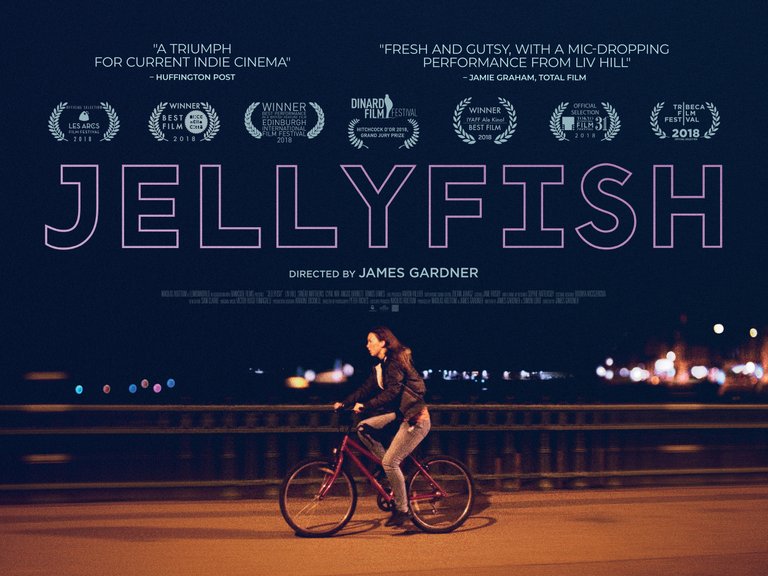 |
|
|---|---|
 |
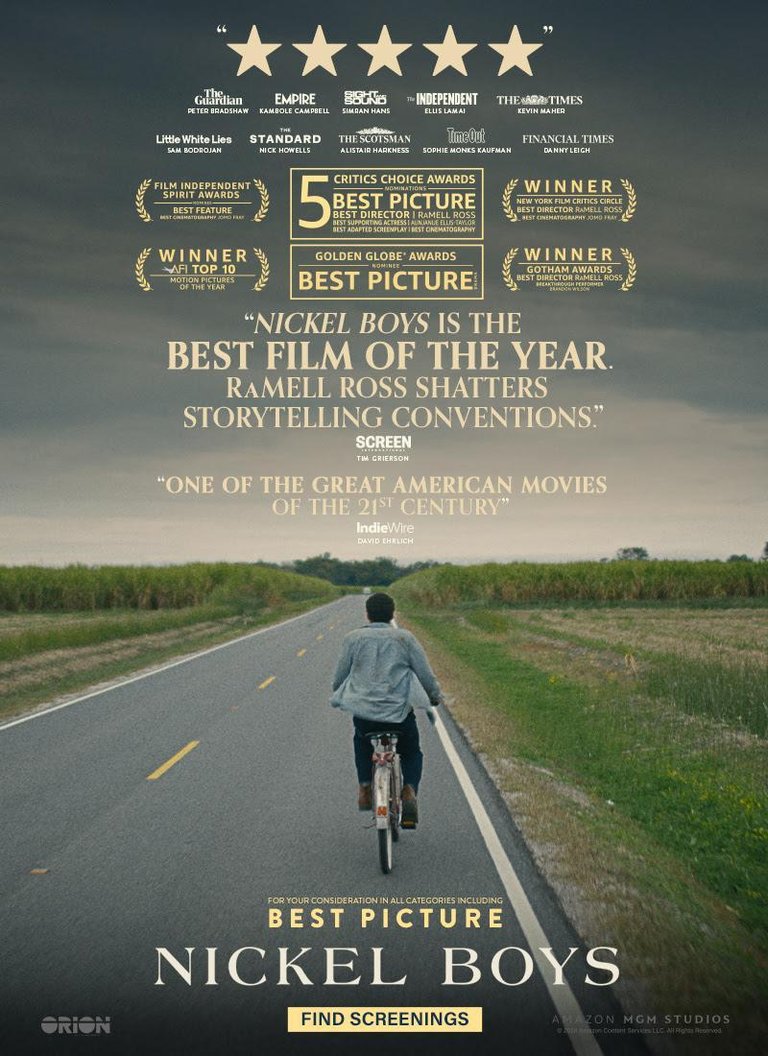
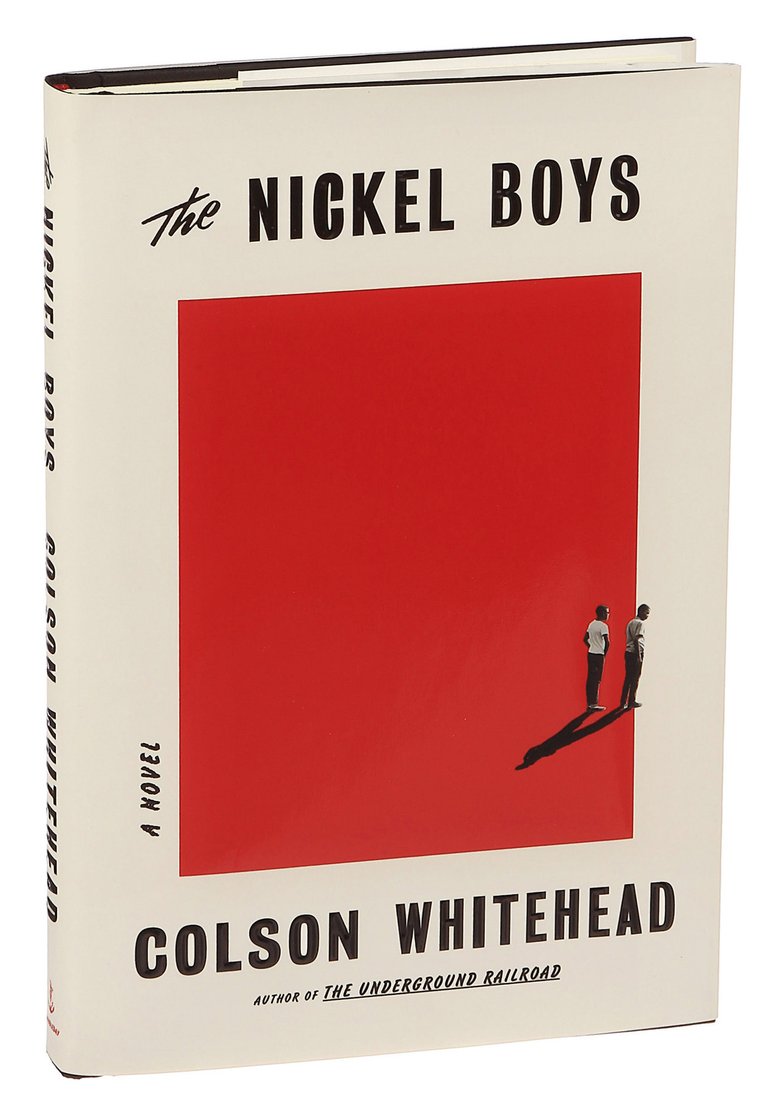
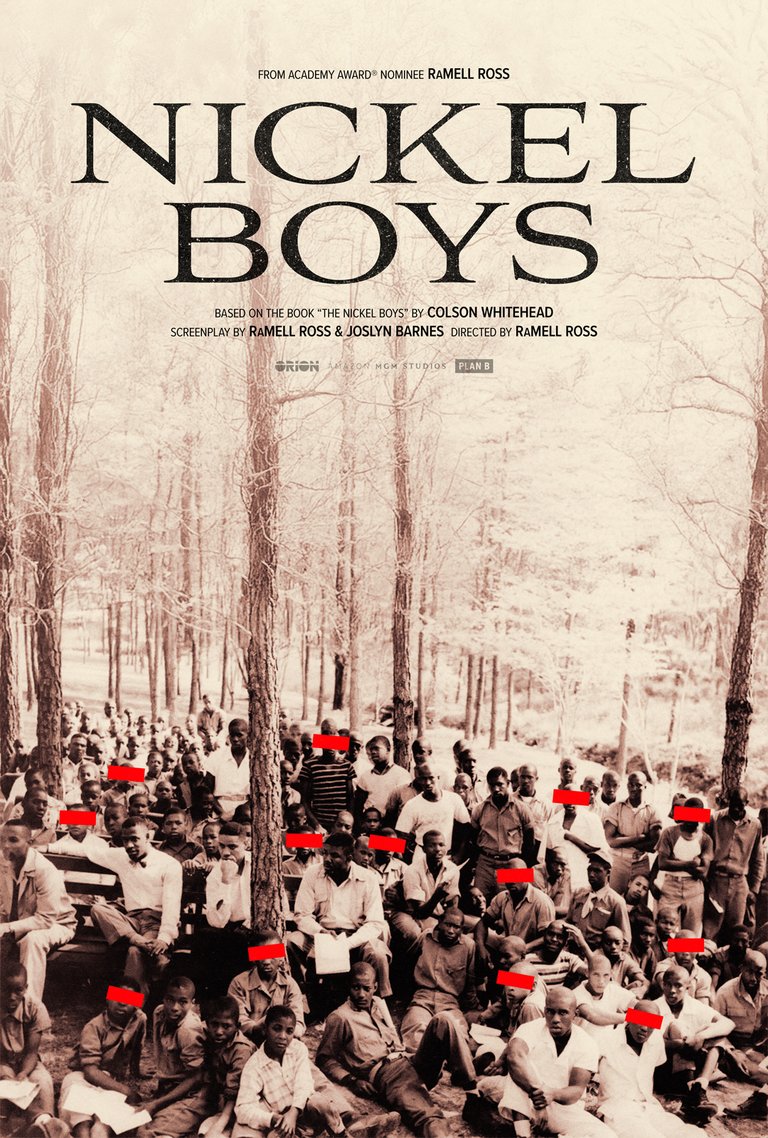
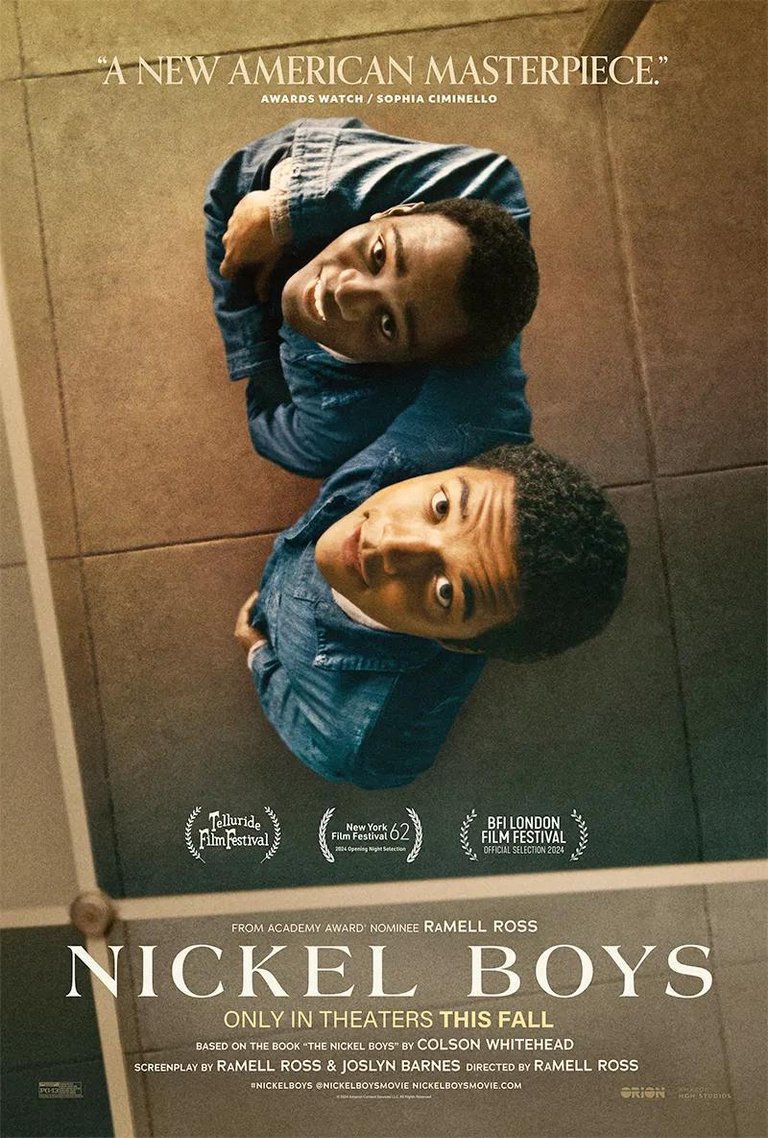
Yo me pude ver casi todas las peliculas que estaban en esa categoria, solo me faltaron 3 por ver, sin embargo esta pelicula causo en mi un impacto, los elementos audiovisuales, el dinanimos con la camara (Me parecio increible) la historia (Impactante) en mi interior deseaba que se ganara un premio, pero no fue asi. Nickel boys son de esas joyitas que no pueden pasarse de desapercibido. Increible Review.
Es cierto que no ganó mucho, pero el guion sí se llevó un premio (en los Satellite, creo). Es una joyita en verdad y el libro también es muy bueno. Saludos y muchas gracias por compartir tu opinión.
¡Felicitaciones!
Estás participando para optar a la mención especial que se efectuará el domingo 30 de marzo del 2025 a las 8:00 pm (hora de Venezuela), gracias a la cual el autor del artículo seleccionado recibirá la cantidad de 1 HIVE transferida a su cuenta.
¡También has recibido 1 ENTROKEN! El token del PROYECTO ENTROPÍA impulsado por la plataforma Steem-Engine.
1. Invierte en el PROYECTO ENTROPÍA y recibe ganancias semanalmente. Entra aquí para más información.
2. Contáctanos en Discord: https://discord.gg/hkCjFeb
3. Suscríbete a nuestra COMUNIDAD y apoya al trail de @Entropia y así podrás ganar recompensas de curación de forma automática. Entra aquí para más información sobre nuestro trail.
4. Visita nuestro canal de Youtube.
Atentamente
El equipo de curación del PROYECTO ENTROPÍA
Gracias por su apoyo!
Wonderful movie and amazing photography 💕💕
It's a great movie indeed and a nice way of filming. Greetings